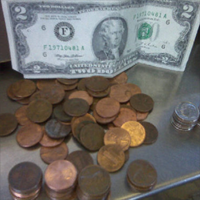I spent the five happiest years of my life in a morgue. As a forensic scientist in the Cleveland coroner’s office I analyzed gunshot residue on hands and clothing, hairs, fibers, paint, glass, DNA, blood and many other forms of trace evidence, as well as crime scenes. Now I'm a certified latent print examiner and CSI for a police department in Florida. I also write a series of forensic suspense novels, turning the day job into fiction. My books have been translated into six languages.
I do both, but it depends entirely on your department. People at smaller departments usually have to cross train and fill several roles. At larger departments with more personnel, people may specialize. The only way to know is to call the agency you want to work at and ask.
I was going to email your teacher but you didn't give me her complete address, just her name. Please go to my website and hit 'contact me' and let me know where to send a response. Thanks and good luck with your project.
I'm not sure what you mean by 'off the job training.'
Not often. Since a glove itself isn't secreting sweat and oils, there's really nothing for it to make a print with until it gets a little dirty or if the surface it's touching is a little dirty.They can be wiped off as easily as any other print.
Toll Collector
 Do you think there will be a time where all tolls are automated?
Do you think there will be a time where all tolls are automated?
Sommelier
 What's your favorite bottle of wine for under $20?
What's your favorite bottle of wine for under $20?
Server / Bartender
 How much more do female servers get tipped?
How much more do female servers get tipped?
That depends on how much time has elapsed and the environment. Of course the more time, the longer it's been the more decomposition will have occurred. A very fresh body might not smell like much of anything and a very decomposed one can smell like terrible bodily functions or really rotten garbage. A very dry environment might cause the body to desiccate (much less smelly) or a wet one will prompt more decomposition.
First question: My guess is (simply based on experience) is there would still be sticky blood at the head wound enough to smear on stuff, perhaps. It wouldn't be spurting or perhaps even dripping at that point because it should have begun to coagulate. Provided it didn't dry entirely, so the body would need to be in a place that's neither too dry nor too hot and certainly not both. Cool and humid would keep it from drying. The killer might bash the head but there could be a lack of blood spatter or flowing/pooling blood from the wound, since the blood won't be flowing as it would be if the person had still been alive. Also the problem with moving the body is lividity where the blood pools at the lower spots of the body due to gravity (like on the back if the person is lying supine. After several hours it should be fairly noticeable and then if you move the body, the lividity pattern doesn't quite match the position.
Hope that helps!
That would depend on what it is you want to do. If you want to work on crime scenes, then I would say to major in forensic science. If you want to work in a toxicology lab, then the degree in pharmacy might be better. I really don't know so I would examine job requirements listed in online vacancy postings, or call agencies at which you might want to work and ask them. Best of luck!!
-OR-
 Login with Facebook
Login with Facebook (max 20 characters - letters, numbers, and underscores only. Note that your username is private, and you have the option to choose an alias when asking questions or hosting a Q&A.)
(A valid e-mail address is required. Your e-mail will not be shared with anyone.)
(min 5 characters)
By checking this box, you acknowledge that you have read and agree to Jobstr.com’s Terms and Privacy Policy.
-OR-
 Register with Facebook
Register with Facebook(Don't worry: you'll be able to choose an alias when asking questions or hosting a Q&A.)